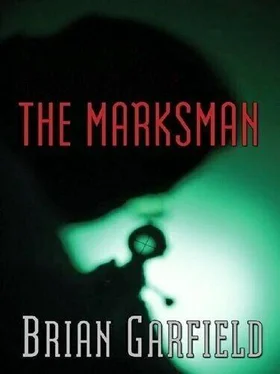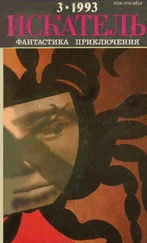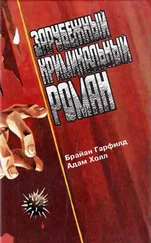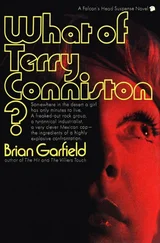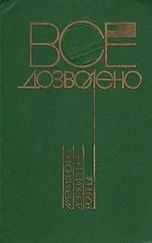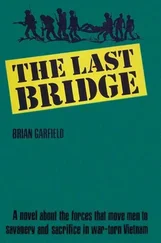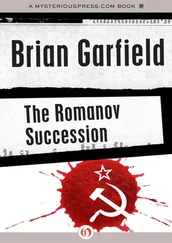Брайан Гарфилд - The Marksman
Здесь есть возможность читать онлайн «Брайан Гарфилд - The Marksman» весь текст электронной книги совершенно бесплатно (целиком полную версию без сокращений). В некоторых случаях можно слушать аудио, скачать через торрент в формате fb2 и присутствует краткое содержание. Город: Waterville, Год выпуска: 2003, ISBN: 2003, Издательство: Five Star, Жанр: Криминальный детектив, на английском языке. Описание произведения, (предисловие) а так же отзывы посетителей доступны на портале библиотеки ЛибКат.
- Название:The Marksman
- Автор:
- Издательство:Five Star
- Жанр:
- Год:2003
- Город:Waterville
- ISBN:978-0-7862-4322-8
- Рейтинг книги:4 / 5. Голосов: 1
-
Избранное:Добавить в избранное
- Отзывы:
-
Ваша оценка:
- 80
- 1
- 2
- 3
- 4
- 5
The Marksman: краткое содержание, описание и аннотация
Предлагаем к чтению аннотацию, описание, краткое содержание или предисловие (зависит от того, что написал сам автор книги «The Marksman»). Если вы не нашли необходимую информацию о книге — напишите в комментариях, мы постараемся отыскать её.
The Marksman — читать онлайн бесплатно полную книгу (весь текст) целиком
Ниже представлен текст книги, разбитый по страницам. Система сохранения места последней прочитанной страницы, позволяет с удобством читать онлайн бесплатно книгу «The Marksman», без необходимости каждый раз заново искать на чём Вы остановились. Поставьте закладку, и сможете в любой момент перейти на страницу, на которой закончили чтение.
Интервал:
Закладка:
Brian Garfield
The Marksman
By Way of Introduction…
This story was written in the mid-1980s as an original screenplay. The producer to whom it was delivered sent back a note indicating his disappointment with the script. He wrote, “The story is too old-fashioned. It has a beginning, a middle and an end.” I’m not making that up. In that estimable gentleman’s honor, I have divided this narrative version of the story into three acts, labeled — well, you’ve already figured that one out.
The organization that was to have filmed this one tumbled into Ozymandian ruins, like most independent movie companies, and Marksman went to a shelf in my house where, like most unfilmed scripts, it remained unread by anyone except a producer and the author’s agent and the author’s wife.
In its original form the script is 105 pages in length. It would have made for a movie about 95 minutes long; but a screenplay contains a great deal of white space. It is in fact no longer than a novelette, or extended short story. A screenplay is nothing more than a sheet of instructions for filmmakers and actors to keep at hand while they assemble their movie out of such components as they may have gathered. Often it’s true that the tricks attributed by cineaste critics to “marvelous directorial touches” are in fact specified clearly in a writer’s screenplay before a director ever gets near the picture; but generally speaking, a screenplay does not (or at least should not) tell directors how to direct, actors how to act, cinematographers how to photograph, or audiences how to feel. The screenplay simply tells us what happens. It’s up to the actors, the director, the photographers and the sound team, the editors and the audience to interpret these happenings. The writer creates the story, but everyone has to bring something to it — the writer alone does not make a movie unless he also happens to be producer, director, cast and crew.
Screenwriting Rule One: A script is a blueprint for illusion, and its every sentence must meet one of two criteria — it must be dialogue, or it must begin figuratively with the words “we see” or the words “we hear”.
If the camera can’t see it or the microphone can’t hear it, then it cannot be filmed, and therefore it doesn’t belong in the screenplay.
In preparing this story for publication in narrative form, I’ve eliminated the abbreviations and jargon that may make screenplays annoying or confusing. (How many readers can be expected to know that because of an obscure Hungarian director’s pronunciation in the 1930s, “MOS” means “Mit-Out Sound,” which is filmese for “without sound” or “silent”?) I’ve added bits and pieces in order to clarify events — a few lines or words here and there, in the effort to make it readable. But I have not tried to disguise its origins; it remains quite staccato. In movies people rarely talk in long paragraphs — everything’s a one-liner. It’s best to leave those essences alone.
I think most screenplays that are padded into novels turn out to be anemic novels at best; a movie script is a simplified form of storytelling because it is external — it cannot go inside a character and feel what that character feels, nor can it deal very effectively with ideas of any complexity.
This was not yet a shooting script; it was a second or perhaps third draft, and because of minor revisions it contained a few loose threads, unnecessary characters and incomplete thoughts. Those probably would have been caught by the writer on the next go-round, or by a director or producer, or at least by a script supervisor on the set. In the present situation, however, if the reader should chance upon an incongruity or mistake, please blame it not on the writer — never on the writer! — but on the Optical-Character-Recognition scanner that rendered the script into computer-editable form.
The Marksman is an action-suspense story, in which changes in the main character are triggered by violent events. It contains very short scenes and jump-cuts; I haven’t tried to smooth them over. It does not confine itself to the viewpoint of any single character in a scene, as narrative fiction ought to do. It makes leaps in logic, understanding that actors can bridge those by creating appropriate shifts in the ways their characters change their minds about one another and therefore change the ways they behave with one another. It asks the reader to become camera and microphone — to imagine and visualize the people and events that are depicted in blueprint form — and it provides plenty of leeway for the stunt wranglers and FX enthusiasts who have become the tail that wags the dog of commercial cinematic storytelling. All this may make more work for the reader; I hope it does not harm the story.
— Brian Garfield
Los Angeles: October 2002
A Beginning…
On a sagging cot in a flyspecked room in an inner-city flophouse, a man tosses and turns. In his sleep he’s hearing a racket of combat — explosions, automatic weapons, screams. Against his eyelids images flash like the intermittent flare of artillery on a battlefield at night.
He pushes the half-awake nightmare away. The effort is enough to exhaust him. After a few moments his breathing steadies and he rises in a sweat, disoriented for a moment before he recognizes his drab surroundings.
He hasn’t shaved in a while. His brown hair is stringy. There’s a wicked long scar across his temple; the old wound makes his head ache — makes him wince when he bends over to get into his rumpled old clothes.
C. W. Radford — that’s his name. He’s got the remains of a good constitution but he looks barely one step up from a homeless tramp. The jeans and work-shirt are threadbare. His shoes are utterly worn out. He laces them up with bovine listlessness. The headache makes him dizzy.
In the rickety bedside drawer is a small case that was designed to be a diabetic’s insulin kit — its ersatz leather worn away at the corners now, cardboard showing through the edges. He flips open its lid on loose hinges to expose the syringe within, and the small rubber-topped bottle with its prescription label: “every four hours as needed for pain.”
Radford draws liquid into the syringe and injects himself with its needle.
Radford trudges across a filthy street in a bitterly silent part of the city — beat-up cars and derelicts human and inanimate. The corner is dominated by an all-night joint, Charlie’s Cafe — in its original incarnation a drive-in burger joint; subsequently expanded to a quarter-block sprawl of counters and Naugahyde booths, all of it much the worse for wear now — neon beer ads in the windows.
A dealer, wearing a wild shock of red hair and clothed in what used to be combat fatigues, transacts business with a skinny teenage girl. Radford glances at the two of them, shifts his glance away and continues walking toward Charlie’s Cafe.
With the deftness of a sleight-of-hand artist the dealer pockets the girl’s money, looks warily around and slips her a tiny package. When she hurries away, the dealer sizes up Radford with a bellicose challenge but Radford shuffles past, appearing to ignore him.
Reflections glitter off the license plate on a parked van — 7734 OL — and above the plate two men sitting in the van watch Radford. They both wear shirts, no jackets; collars unbuttoned, ties at half mast. The guy in the passenger seat is polished, neat, fortyish and smoking a cigarillo. Next to him the driver bats ineffectually at the smoke. This driver is big, tough, a body-builder. The van is a custom camping job — drapes etc.
It would appear that Radford gives them no more attention than he gave the redheaded dealer.
Читать дальшеИнтервал:
Закладка:
Похожие книги на «The Marksman»
Представляем Вашему вниманию похожие книги на «The Marksman» списком для выбора. Мы отобрали схожую по названию и смыслу литературу в надежде предоставить читателям больше вариантов отыскать новые, интересные, ещё непрочитанные произведения.
Обсуждение, отзывы о книге «The Marksman» и просто собственные мнения читателей. Оставьте ваши комментарии, напишите, что Вы думаете о произведении, его смысле или главных героях. Укажите что конкретно понравилось, а что нет, и почему Вы так считаете.
